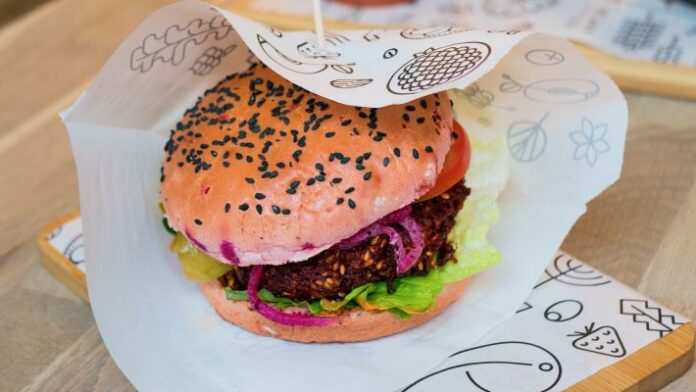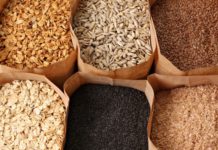What does it mean to be masculine? Is it the misty vision of chiselled male physiques, big biceps and shredded abdominals, glistening with sweat? Some might say so. Even the Village People famously wanted to be macho men.
The Cambridge Dictionary defines “masculinity” as “the characteristics that are traditionally thought to be typical of or suitable for men.” Merriam Webster as “the quality or nature of the male sex : the quality, state, or degree of being masculine or manly.” ‘Vigour’, ‘strength’, ‘virility’, and ‘manliness’ are common synonyms – but then again so are their lesser equivalents ‘machismo’ and ‘chauvinism’. And of course who can forget one of today’s premier social buzzwords ‘toxic masculinity’ – which has even garnered an honourable mention on WebMD. No two men are the same and the scope of what we can understand masculinity to mean is broadly nuanced – and so why is it that as a society we’ve come to marry these traits so irrevocably to the consumption of meat?
All around the world, if you happen to be born with XY chromosomes, a refusal to feast on flesh will almost certainly incite ridicule by one’s peers; with your proud masculinity placed on trial. We’ve all heard the popular jokes about vegans being ‘non-hunters’, weak or deficient in some way – which leave little surprise as to why the average male would preferably run with the pack, and go beef rather than go home. When you look at it this way, masculinity, or at least masculinity-by-popular-agreement seems so fragile. What happens to your masculinity when all your male friends begin eating plant-based?
In Germany, Europe’s leading plant-based food market, only 19 percent of vegans are men despite an equal national gender split. It can be puzzling and various studies have explored how masculinity is often linked to meat-eating, and vegan associations with femininity.
The Frontiers journal examined the effects of framing veganism through a masculine lens on men’s attitude towards vegan food and found that men might feel less resistance and become more likely to consume it. However even with describing plant-based burgers using masculine words preferences by respondents rose only slightly. Short-term interventions show meagre results in shifting the perception regarding gender suitability of vegan food away from femininity. It’s undeniable that gender stereotypes include food choices – men are just more inclined to consume in a gendered way to steer social perception. One study found that conformity to traditional gender roles was still a good predictor of people’s meat consumption and openness to vegetarianism.
Books such as The Sexual Politics of Meat and The Pornograhpy of Meat argue that in a world heavily invested in a gender binary every time a man becomes a vegan it challenges our basic assumptions about masculinity and femininity. And as we know for some this challenge is a bridge too far. The demonisation of non-animal diets can be traced back to what is now widely known as the protein myth: a mediaeval idea that meat as a primary protein source is the key to physical strength – yet research has debunked the notion that plant-based foods can’t provide enough protein.
Unfortunately group status isn’t the only thing hanging in the balance for diminished masculinity when it comes to men not eating meat, as this may come with other biases as well. As if the social judgements and pressures to conform to masculine expectations isn’t enough; a study in the Journal of Social Psychology showed that vegan men can be seen as less capable compared to carnivores,for performing traditionally ‘masculine jobs’, such as financial analysts, or in other high-pressure careers. Just imagine losing out on an employment opportunity not due to your credentials or experience, but due to the contents of your kitchen. This is all above and beyond the usual slew of misinformation regarding vegan nutrition that may put men off reaching for beans instead of bacon.
So in the pursuit to normalise plant-based diets, clearly veganism has an image-problem that needs to be redeemed.
Forget ‘Soy Boys’ – Enter the ‘Vegan Bro’
In truth, muscularity and masculinity can all be had without meat. The success of vegan athletes has been changing many men’s attitudes towards plant-based protein and there’s a whole new demographic of intrepid males who bullishly flaunt their vegan status.
The 2018 Netflix documentary The Game Changers follows UFC fighter James Wilks as he investigates the benefits of a plant-based diet for professional athletes, demonstrating that it can abundantly deliver both strength and endurance. The show was executive produced by Arnold Schwarzenegger, co-produced by Formula One winner Lewis Hamilton and includes presentations by tennis legend Novak Djokovic and Jackie Chan – alongside numerous endurance runners, American footballers, boxers and strongmen who support plant-based eating.
Vegan influencers have been dominating social media; such as world record weightlifter Patrik Bouboumian, weightlifting champion Ryan Stills, professional arm wrestler Rob Bigwood, and Jordan Dranes, whose feeds drip with hard body muscle shots. Even ‘Iron Mike’ Tyson, former boxing heavyweight champion of the world, has embraced the benefits of plant-based nutrition. And it’s not all about bulking up; Scott Jurek is an ultra distance runner who held the USA record for most kilometres run in 24 hours and smashed the gruelling Appalachian trail record.
The provocative 2014 book Meat Is for Pussies: A How-To Guide for Dudes Who Want to Get Fit, Kick Ass, and Take Names by triathlete author John Joseph has become a seminal classic in crushing myths around meat and masculinity. And the Bad Manners cookbooks by Thug Kitchen weave potty-mouth humour and bro stereotypes into sumptuous, substantial recipes. Boys can still be boys – even with a little soy.
It’s no secret that male audiences tend to be drawn to media such as films and series that celebrate some of the great warrior traditions of the past – heroic epitomes of masculinity, tough as nails. But did you know that these examples also show how kicking the meat is nothing new under the sun?
Evidence suggests that the average rugged Roman gladiator ate a diet high in carbohydrates, such as barley and beans, and low in animal proteins. Their meals looked nothing like the meat-and-fish centric diets now associated with elite fighters. The warlike and conquering exploits of the ancient Greeks need no introduction, and even they lived mainly on grain staples. Who could forget the fierce samurai who largely ate seaweed, pickled vegetables, rice and seasonal fruit. None of these powerful male icons lived on anything like the steak & brisket diet now assumed to be macho and strength-inducing.
Testosterone is the major sex hormone in males and there has been much misinformation about the oestrogen levels present in soy, implying that men who consume it will be feminised, less strong and impotent. Research has shown that these claims have no credibility, and that soy consumption does not affect testosterone levels. Soy products or isoflavone supplements have no effect on the free testosterone concentration in men and their levels did not go down after intake.
There are however good reasons to suspect a negative impact on the male reproductive capacity with the consumption of animal products:
Fifty Shades Greener
While the old dictum runs that the way to a man’s heart may be through his stomach; the path to change what’s on his plate might in fact run through his genitalia. And if there’s one thing that any cisgendered male cares more about than peer approval; it’s his potency.
According to Dr. Michael Greger, “Dioxins, endocrine disrupting pollutants, heavy metals, saturated fat, and steroids in the meat supply may be affecting sperm counts, semen quality, and the ability of men to conceive.”
Erectile dysfunction [ED] – perhaps the most harshly mocked of all organ failures – has become a pandemic. The Mayo Clinic reports that more than half of men between the ages of 40 and 70 experience some form of ED. Heart disease, atherosclerosis, high cholesterol, diabetes and obesity – all conditions that are strongly linked to meat consumption – can cause ED, and as a corollary ED has been used as a diagnostic criteria for identifying cardiovascular disease. Problems downstairs can be telling about problems upstairs.
Dr. Neal Barnard from the Physicians Committee for Responsible Medicine explains that if you’re suffering from ED; it’s not you – it’s meat. If you’re having problems underneath the sheets, or care about not having them some day, it may be time to swap out that limp hotdog for a carrot stick at the dinner table.
Since both coronary heart disease and impotence can be reversed with a healthy plant-based diet, perhaps sexual dysfunction can be a motivator to change lifestyle habits. Meat-eating men struggling with their potency may find themselves between some broccoli and a hard place if they wish to maintain their sex life.
On the first of November, World Vegan Day, The Vegan Society announced new research which showed that 41 percent of non-vegan men in the UK have expressed an interest in going vegan or have said they are planning to go vegan in the future – primarily among the 25-43 age group. There are now three and half times as many vegans as there were in 2006 in Great Britain, making it the fastest growing lifestyle movement. While having gained popularity in the UK only an estimated 37 percent of the vegan population are male, which with a few exceptions, is roughly commensurate with the plant-based gender split in other nations.
In South Africa we’ve tended to have a profoundly macho, sports-centred culture that spans all racial groups, tied to the habitual, almost ritualistic enjoyment of meat. Vegans are estimated to be around half a million out of the over 60-million people in the country. But organisations such as ProVeg South Africa have been turning the tide, engaging in the retail and restaurant space, and today plant-based options are plentiful when compared to the scarce availability of just over a decade ago. Programs such as the Veggie Challenge and the annual Veganuary campaign are specially designed to support people new to plant-based through their first month of giving it a try.
Perceptions are changing and with the erosion of the meat-masculinity cliché inevitably more men will begin to make the transition. Health, environmental sustainability, and helping create a more equitable food system are some of the many reasons why men should eat plants rather than body parts. Isn’t ensuring that you take steps to live to a ripe old age caring for your family, and exercising a duty to safeguard our environment for future generations a show of masculine responsibility? Or is resorting to the tired cultural tropes of the meat-eating man enough to conveniently dissuade you?
For those with a masculinity fixation; there’s no reason why you can’t identify with healthy cultural male attributes without meat, and there’s no sacrifice to strength or vitality.
Veganuary 2024 is free to join, and people can sign up to receive the new 7-Day Revolutionary Meal Plan, Celebrity eCookbook, the Official Veganuary Starter Kit and 31 daily emails packed with nutritional info, delicious recipes, meal plans and helpful advice.







